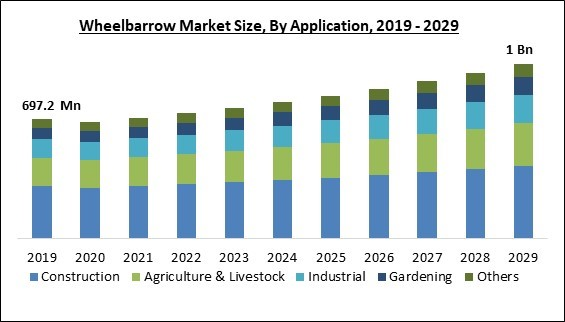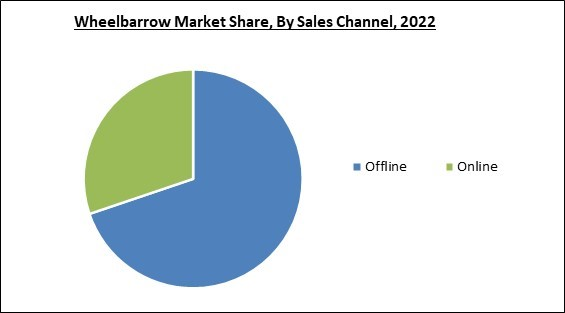Gardening is one of the growing applications of Wheelbarrow as popularity of do-it-yourself (DIY) projects and home improvement activities has increased, thus, it is expected to capture 1/5thshare of the market by 2029. These are frequently used by homeowners and DIY enthusiasts for tasks such as moving soil, rocks, or construction materials around their properties. With a greater emphasis on outdoor living and creating inviting outdoor spaces, homeowners and businesses are investing in landscaping and garden improvements. Additionally, the proliferation of landscaping and garden centers, which cater to professional landscapers and individual customers, contributes to the growth of the market. Some of the factors impacting the market are increasing demand for wheelbarrows in the construction industry, growing introduction of product innovation, and variations in the cost of raw materials.
Urbanization, industrialization, technological advancements in equipment and machinery, and economic expansion are assisting in expanding construction operations. Rapid urbanization has increased the demand for basic infrastructure in countries such as the Asia Pacific and LAMEA. Furthermore, economic growth in many regions promotes corporate, residential, commercial, and industrial property construction. These large-scale advancements and investments are predicted to fuel its need in construction activities. In the coming future, an increase in demand is anticipated as a result of an increase in demand for non-marking tires. These tires can be used to remove tire markings left on warehouse floors. Due to hygienic concerns, food and grocery processing industries increasingly use wheelbarrows with non-marking tires to eliminate black markings in factories and warehouses. Similarly, development of the two-wheeled variant was one of the most significant breakthroughs in ergonomic wheelbarrow design.
However, Wheelbarrow manufacturing heavily depends on various raw materials, particularly plastic, steel, and wood. As a result, shifting raw material prices greatly impacts the market. The two main basic materials used to make plastic are natural gas and crude oil. As a result, producers instantly pass on cost changes to their consumers, which causes changes in the costs of oil and gas to affect the cost of plastic ingredients and resin.
Sales Channel Outlook
By sales channel, the market is divided into online and offline. The offline segment witnessed the maximum revenue share in the market in 2022. Traditional distribution methods, including interactions between the distributor and the customer, comprise the offline channel. The most common offline channel, the in-store method, is widely utilized for purchasing wheelbarrow vehicles in bulk for major building sites. The high prevalence of offline channels is the main factor aiding the advancement of the segment’s growth.Application Outlook
On the basis of application, the market is classified into construction, industrial, gardening, agriculture & livestock, and others. The construction segment acquired the largest revenue share in the market in 2022. Wheelbarrows are used in the construction sector to transport materials like sand, aggregates, cement, and other building materials. By handling a large amount of material at once, a wheelbarrow saves the worker a lot of labor. Transporting raw materials used in construction to remote locations is one of the major applications of wheelbarrows.Wheel Outlook
Based on wheel, the market is characterized into single, double, and multi. The multi segment procured a considerable growth rate in the market in 2022. The segment is expanding as the multi-wheeled wheelbarrow is considered safe and easy to navigate. A wheelbarrow with several wheels has a minimum of two stable wheels that are positioned so it won't tip over when stationary. These types of wheelbarrows are composed of plastic or metal and are generally used for material handling at construction sites, industrial plants, agriculture and livestock, and other areas.Regional Outlook
Region wise, the market is analyzed across North America, Europe, Asia Pacific, and LAMEA. The Asia Pacific segment procured the highest revenue share in the market in 2022. India and China are two of the Asia Pacific region's most important marketplaces. In terms of demand, the two nations account for a major portion of the market in the region. This is mostly owing to these countries' efforts to upgrade their infrastructure. The market in the Asia Pacific region is predicted to develop at a significant pace over the forecast period. This is due to a growth in construction projects such as electricity generation, railway expansion, highway construction, and cargo export and import.The market research report covers the analysis of key stake holders of the market. Key companies profiled in the report include Stanley Black & Decker, Inc., Silvan Australia Pty Ltd, Bullbarrow Products (TWP Group), Haemmerlin SAS (CDH Group), Griffin Bros Truck & Equipment, Qingdao Taifa Group Co., Ltd, Qingdao Xinjiang Handtruck Co., Ltd, The Walsall Wheelbarrow Co Ltd., and Wolverine Products (Sure-loc Landscape Edging Corporation).
Scope of the Study
By Sales Channel
- Offline
- Online
By Wheel
- Single
- Double
- Multi
By Application
- Construction
- Agriculture & Livestock
- Industrial
- Gardening
- Others
By Geography
- North America
- US
- Canada
- Mexico
- Rest of North America
- Europe
- Germany
- UK
- France
- Russia
- Spain
- Italy
- Rest of Europe
- Asia Pacific
- China
- Japan
- India
- South Korea
- Singapore
- Malaysia
- Rest of Asia Pacific
- LAMEA
- Brazil
- Argentina
- UAE
- Saudi Arabia
- South Africa
- Nigeria
- Rest of LAMEA
Key Market Players
List of Companies Profiled in the Report:
- Stanley Black & Decker, Inc.
- Silvan Australia Pty Ltd
- Bullbarrow Products (TWP Group)
- Haemmerlin SAS (CDH Group)
- Griffin Bros Truck & Equipment
- Qingdao Taifa Group Co., Ltd
- Qingdao Xinjiang Handtruck Co., Ltd
- The Walsall Wheelbarrow Co Ltd.
- Wolverine Products (Sure-loc Landscape Edging Corporation)
Unique Offerings
- Exhaustive coverage
- The highest number of Market tables and figures
- Subscription-based model available
- Guaranteed best price
- Assured post sales research support with 10% customization free
Table of Contents
Companies Mentioned
- Stanley Black & Decker, Inc.
- Silvan Australia Pty Ltd
- Bullbarrow Products (TWP Group)
- Haemmerlin SAS (CDH Group)
- Griffin Bros Truck & Equipment
- Qingdao Taifa Group Co., Ltd
- Qingdao Xinjiang Handtruck Co., Ltd
- The Walsall Wheelbarrow Co Ltd.
- Wolverine Products (Sure-loc Landscape Edging Corporation)










